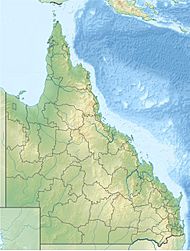Mouth of Baffle Creek Conservation Park facts for kids
Quick facts for kids Mouth of Baffle Creek Conservation ParksQueensland |
|
|---|---|
|
IUCN Category III (Natural Monument)
|
|
| Nearest town or city | Bundaberg |
| Established | 1990 |
| Area | 3.12 hectares (7.7 acres) |
| Managing authorities | Queensland Parks and Wildlife Service |
| Website | Mouth of Baffle Creek Conservation Parks |
| See also | Protected areas of Queensland |
The Mouth of Baffle Creek Conservation Parks are two special protected areas. They are located right where the Baffle Creek meets the ocean. You can find them on the central coast of Queensland, Australia.
These parks are important because they protect a unique part of the coast. They are managed by the Queensland Parks and Wildlife Service.
Contents
What are the Mouth of Baffle Creek Conservation Parks?
These parks are a total of 312-hectare (770-acre) in size. That's about the size of 312 football fields! They are part of the larger Great Barrier Reef Marine Park coastal area.
Baffle Creek is one of the few rivers in Queensland that is still mostly untouched. Its mouth, where it flows into the sea, is a very special place.
What Makes These Parks Special?
The parks feature beautiful sandy beaches. Behind the beaches, you'll find woodlands with eucalyptus and she-oak trees. It's a great example of a natural coastal environment.
One of the parks has a camping area. This area is located behind the sand dunes on the northern side of the creek. There is no camping on the southern side.
The Two Parks
There are actually two separate conservation parks here. Each one protects a different part of the creek's mouth.
Mouth of Baffle Creek Conservation Park 1
This park is 125-hectare (310-acre) big. It is located on the southern side of the creek's mouth. This park was first protected in 1995. Its main purpose is to protect an important area of mangrove forest.
Mouth of Baffle Creek Conservation Park 2
This park is 187-hectare (460-acre) in size. It protects the northern side of the creek's mouth. This park was first protected in 1997. More land was added to its protected area in 2010.
 | Percy Lavon Julian |
 | Katherine Johnson |
 | George Washington Carver |
 | Annie Easley |


